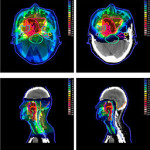
A Radiation Oncology Attending's Perspective: From an interview with a radiation oncology attending.
Part of an interview series entitled, "Specialty Spotlights", which asks medical students' most burning questions to physicians of every specialty. See what doctors from every specialty had to say about why they chose their specialty and how to match in their residency.
- What attracted you to radiation oncology?
I realized that a radiation oncologist has a unique opportunity to serve as a physician for patients at a very difficult time, and I appreciated the emphasis on shared decision making and communication skill by my mentors in the field. I also enjoyed the emphasis on anatomy and imaging.
- Describe a radiation oncologist's typical work day?
I typically arrive at around 7am when treatment begins for the day. Most of a radiation oncologist’s work is in an outpatient clinic. The day is spent seeing new consultations, follow-up visits, and evaluating patients who are currently under treatment. When you aren’t seeing patients, your time is usually spent creating individualized radiation treatment plans for new patients, which includes doing a CT simulation, contouring, and planning with a dosimetrist and physicist.
- What type of lifestyle can a radiation oncologist expect?
Nearly all of a radiation oncologist’s work is in an outpatient setting, which means that nights, weekends, and holidays are usually free. This is one of the more attractive features of the specialty.
- What is the potential salary of a radiation oncologist?
The average salary varies significantly between academic settings and private practice. There is a wide variety of compensation agreements depending on each unique situation.
- What is the job market like for radiation oncology?
Radiation Oncology is a very small field. For example, in some less populous regions, an entire state might have around 16 radiation oncologists. Because of that, it can be challenging to find a job in a specific geographic region. If it is essential for you to live in a certain region, be aware that it might be difficult to make that happen, and that you might have to accept significant compromises to get a job in a given area. This is one of the drawbacks of radiation oncology. If geography and flexible location are important to you, other larger specialties might make for an easier job search (e.g. internal medicine, anesthesiology, etc).
- What can you tell us about radiation oncology subspecialties?
Most radiation oncologists complete their training after the 5 year residency without doing a fellowship. A fellowship can sometimes help to bolster academic credentials if needed or be used as a segue into a job at a desirable institution. Common fellowships include pediatric radiation oncology and proton therapy.
- What are the potential downsides of radiation oncology that students should be aware of?
If you have academic aspirations, it can be difficult to find protected time as a radiation oncologist. Geographic limitations are an important consideration (see above).
- How competitive is the radiation oncology match?
Very. Radiation Oncology attracts students with great boards scores, strong letters of recommendation from mentors, and ample research experience.
- What must a student do to match well in radiation oncology?
Students must obtain great board scores, demonstrate research productivity, and produce strong letters of support from mentors who know you well.
- What are residencies looking for in a radiation oncology resident?
Strong credentials will open the door for an interview. Beyond that, programs are looking for someone who can carry on a normal conversation and has a pleasant personality.
- What should students be looking for in a radiation oncology residency?
It can be interesting to look at where graduates end up after residency. There is a wide variety in the quality of didactics, with most radiation biology and physics courses being something that you just have to endure no matter where you match.
- What else would you tell medical students who are considering radiation oncology?
While radiation oncology offers a desirable schedule and good compensation, it is important to go into the field for the right reasons. Keep in mind that as a radiation oncologist, you will be taking care of patients who are very ill, and are often approaching the end of life. To be successful, you will need to develop the skill of navigating these sensitive discussions with agility, and sometimes it can be emotionally exhausting. At the same time, helping patients and their families work through these scenarios is very meaningful and fulfilling work.
Editor's Note: For more help choosing a specialty in medicine, I highly recommend one or both of these two great books. I found both very useful.





 My name is Andrew and I am a first year resident training to be an ophthalmologist. I created ShortWhiteCoats to provide medical students, residents, and the public with all the information I spent so many hours looking for during medical school.
My name is Andrew and I am a first year resident training to be an ophthalmologist. I created ShortWhiteCoats to provide medical students, residents, and the public with all the information I spent so many hours looking for during medical school.







